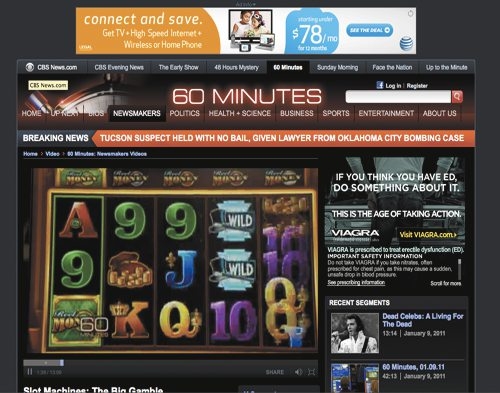Report on gambling draws ire of industry
Gaming industry proponents on Monday poked holes in a report by the CBS news program "60 Minutes" that claimed high-tech slot machines create problem gamblers while cash-strapped states prey on those individuals to provide the gambling revenues needed to close budget deficits.
The segment, titled "Slot Machines: The Big Gamble," aired Sunday night. It drew a quick reaction from American Gaming Association President Frank Fahrenkopf Jr., who oversees the gaming industry's Washington, D.C.-based trade group and lobbying arm.
"Last night's '60 Minutes' program did nothing more than rehash the same discredited arguments that gambling critics have been making for more than 20 years," Fahrenkopf said in an e-mailed statement.
Credit Suisse gaming analyst Joel Simkins told investors in a research note he didn't believe the story would affect stock prices of the major slot machine manufacturers. He thought states would continue to look at the gaming industry as a way of creating jobs, economic development and tax revenues.
"Despite the concerns that '60 Minutes' raised, net-net, we believe that gaming has done an awful lot of good in many economically depressed regions over the years," Simkins said.
The report had two underlying themes: slot machines are addictive and states are increasingly turning to gaming to balance budgets. A problem gambling expert, an anthropology professor from the Massachusetts Institute of Technology, two older female gambling addicts and Pennsylvania Gov. Ed Rendell were interviewed for the segment.
Slot machine company officials were upset the "60 Minutes" report only focused on slot machines, particularly penny slots.
"There are hundreds of different slot machine products that make up the casino floor," said Bruce Rowe, senior vice president of strategy and business development for Bally Technologies. "I felt the report was not supported with data-driven research."
He said Bally supports research to ensure the company's games "don't cause problems for the people who play them."
Fahrenkopf said the gaming industry has "long acknowledged" roughly 1 percent of the adult population cannot gamble responsibly.
"We make great efforts to address this issue, explain how the games work and to promote responsible gaming," Fahrenkopf said. "We simply don't want problem gamblers in our casinos, period."
Bo Bernhard, director of Gambling Research at University of Nevada, Las Vegas' International Gaming Institute and assistant professor in sociology, said the "60 Minutes" report relied on a "faulty study" of how the brain reacts to slot machine images.
Bernhard, who has published reports on problem gambling and Internet gambling, said the study used undergraduate college students, aged 18 to 22, who were novice gamblers.
"It wasn't a study of the reaction of problem gamblers," Bernhard said. "It wasn't representative of the issue. We know the young brain reacts differently to various stimuli. If you want to understand addiction, you have to study problem gamblers."
Bernhard disputed the report's contention that slot machines cause people to become gambling addicts.
"If slot machines are addictive, then why can't the industry get anybody in Asia to play them?" Bernhard asked. "We also know that young people don't really play slot machines."
Rendell was interviewed because of Pennsylvania gaming expansion efforts over the past six years. A new casino opened in Philadelphia in September, the state changed gaming laws last year to allow table games and Pennsylvania casinos could house upward of 61,000 slot machines.
"It is a decent way to raise revenue where the upside that is produced is significantly better than any downside that comes from it," Rendell said on "60 Minutes."
Gaming proponents, however, said quietly that Rendell, who leaves office this month, did not handle himself well. He screamed at the "60 Minutes" crew and became visibly upset when asked if states such as Pennsylvania are balancing budgets on the backs of problem gamblers.
"Anyone who has that vent would be doing it in other places had Pennsylvania not legalized gambling," Rendell said during the interview. "You guys don't get that. You are simpletons. You are idiots if you don't get that."
Simkins said a better argument would have been focused on the billions of dollars gaming has generated for economic development in once-poor markets.
"We have visited a number of areas that have historically been depressed, such as in Tunica, Miss.; Biloxi, Miss.; and northern Indiana," Simkins said. "We would argue that gaming has done a lot of good for the residents of Mississippi. Without gaming, we believe that many of these jobs would not exist today."
Contact reporter Howard Stutz at hstutz@reviewjournal.com or 702-477-3871.




























